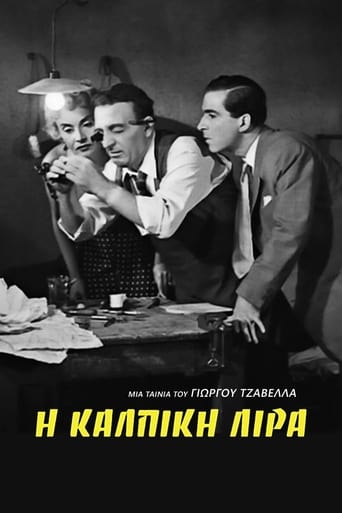Manolis Boulamatis
I'm someone who likes big, CGI-filled action as much as the next fan boy, and rarely ever do I get truly invested in a dramatic film and its characters. I'm not prejudiced against the genre, Ijust demand the film to be above average to impress me. Greek cinema rarely does it for me. I am Greek myself, but Greek cinema has been, especially in recent years, nothing but shallow comedies with brain-dead humor and pretentious films. Granted, there are more than a few exceptions, but that's just the general picture.Enough rambling on about context,let's start talking about this masterpiece. This movie has an amazing cast. Every actor does a great job because they have so much to work with. The script is a humane story with realistic characters and clever conversations. My favorite Greek film of all time. The story centers around a counterfeit coin and people trying to get rid or using it to obtain something they think will make them happy. I'll leave it at that because the brilliant story is something you should see the film to experience.Now let me tell you the few issues I have with the film... Actually, no, I can't find ANY. I'm not even joking. This movie is as close to perfect as most films get. Are there a few aspects of the film that are dated? Sure, but not in the bad way because they will literally transport you to Athens in the 1950's and that's definitely not a bad thing. Besides, the movie itself is absolutely TIMELESS. And I think that's the word best describing it: Absolutely TIMELESS. This is a movie you should watch not only if you like Greek cinema, but if you enjoy cinema in general. I won't recommend it to people who enjoy cinematic abominations such as "I Love Karditsa".
delta_next
If this film was made by a Hollywod director it would feature in the all time top 10. George Tzavelas masterpiece consists of four stories linked together by a counterfeit coin. In each story the characters seek to find happiness or love in things that turn out to be fake, hence the counterfeit pound. In the first story a lifetime silver merchant creates the coin only to realize it brought him nothing but fear, he throws it away and starts a new job as a happy man. In the second story a beggar falls in love with a prostitute and tricks her to sleep with him giving her the fake coin only to realize that she only cares about the money. In the third story a fatherless child finds protection and closure in the hands of a childless man that up till that moment cared only about the money. The final epic conclusion is about a newly married couple that struggle in poverty but remain in love. Until the woman decides to leave her husband for a richer one. He is left alone only with the coin that once represented their love, only to realize that the coin is in fact fake...
Maria-Venetia Kyritsi
I Kalpiki Lira is the greatest Greek film ever made. In other words, there is no other more complete Greek cinematic creation in the years that followed it and certainly there's not going to be another better in the years to come. The story takes us on a very weird journey. That of a counterfeit gold coin. It begins from the moment of its creation by a naive man (Vasilis Logothetidis) who, carried away by his passion and love for an unworthy woman (Ilia Livykou) decides to change his life and takes us through the streets and neighborhoods of Athens in the fifties with its everyday troubles and cares but also with its small moments of happiness, introducing us in the way to dozens of different people, from small girls to lovers who are struggling to survive (Dimitris Horn & Ellie Lambeti) and blind beggars (Mimis Fotopoulos in his most remembered role) ending in an unexpected way and filling us with the knowledge that nothing lasts forever. Only a poor counterfeit coin...
Phoevos-2
One of the top 5 Greek films ever. A story in four parts, a counterfeit sovereign being the protagonist that links all of them. The concept is simple but the way it is carried out is unique. A rare case of skillful directing resting upon great performances by 'real' (i.e. trained in theatre) actors.
